Buying Yelp Reviews Is BAD for Business
April 15th, 2010 by
Yelp is intended as a review site where users can write and read reviews for local businesses to help make informed buying decisions. It’s a powerful tool in that users trust the real opinions and feedback from their friends and neighbors. Yelp’s user-driven reviews allow everyone to add in their opinions of products and services at local clubs, restaurants, and businesses in all forms.
There is obvious value to a small business owner in getting users to leave positive reviews. The question is how much should a business pay for a review? No, no, no … I’m joking. The question really is how do you encourage customers to leave Yelp reviews naturally and organically without abusing the intent of the site?
To Solicit or not to Solicit
Yelp is clear about incentives for reviews: “Yelp has advised business owners not to offer incentives for reviews. For starters, paying people to write reviews about your business is another form of shilling and that’s just wrong. Second, very often you’ll offend a customer and the offer will be quickly outed in your reviews, resulting in unintended negative reviews and/or negative publicity. Finally, it’s typically a fruitless exercise.”
It’s a fruitless exercise because of the Yelp review filter. Yelp knows their site is a great opportunity for illegitimate behavior, and they have built tools to attempt to minimize the spam and attempt to maintain the authenticity of the site. They haven’t been entirely successful. Says Luther Lowe of Yelp,
‘It’s very tough to design algorithms that can tell the difference between the guy who’s cranking out a fake five-star review about himself, and the guy who’s flipped that laptop around and handed it to his customer and said, “Hey, write a five-star review about me.” So, you know, I know that businesses are going to ask people to write reviews. If you do that, you need to be prepared for pretty violent review fluctuation.”
From Yelp Common Questions: “Some reviewers are more credible than others. For the most part, users can decide for themselves which reviewers they trust the most. We remove some of the guesswork by filtering out reviews that are written by less established users. We do this in order to provide more trustworthy and useful content to our users and to help protect against fake reviews from malicious competitors and disgruntled former employees.”


Control Yourself on Yelp
Every small business wants testimonials to help drive traffic. Yelp is tremendously trusted by real world users. (Isn’t it more encouraging to try the new restaurant in town after you read 10 great reviews online?)
And Yelp is tremendously trusted by search engines, and being so trustworthy makes it ripe for abuse by some businesses and internet marketers. The prime example is Google Local map rankings, which are influenced by some degree by the presence of online reviews on select review sites.
But Yelp advises you to control yourself:
“Should I ask customers to write reviews for my business?
While we understand that there is a temptation to solicit reviews from your customers, it is not something we encourage. The most successful businesses on Yelp have had their reviews come organically. This is for a couple of reasons:
1. Potential customers can sometimes have an adverse reaction to a business that looks like it has solicited reviews.
2. Quite often those solicited reviews will be filtered out (see above) based on the activity level of those users within the Yelp community.
If you do ask your customers for reviews, please be prepared for the review number fluctuation that might follow.
Also, keep in mind — success on Yelp is primarily measured by the number of people who view your page and thus walk in the door or set an appointment, not the number of reviews you have. Yelp users are savvy: they care about quality — not quantity — when it comes to your business reviews.”
To be completely genuine, solicitation of reviews even without incentive is frowned upon. And incentivized reviews (buying Yelp reviews) are absolutely unethical … 

This picture taken in the store suggests completing a review, and not only a review … but “as good as it gets” review, to get 20% off the next purchase. One reviewer complains on this business’ Yelp profile about the incentivized review request in the store; Mel T comments on Yelp:
“How would they base the authenticy of a Yelp review? What if I just claimed ownership of Jane D.’s (as in Jane Doe – I’m not trying to impersonate any fellow Yelpers here) review? How would they know if I was really Jane D.?
– Would I still get a discount if I had written a review, but it wasn’t “raving?”
Well, I’m sorry, Pure Beauty. You cannot buy a five star Yelp review from me. Instead, your blantant bribary is going to cost you two whole stars. Yep, that’s right; I’m knocking you down TWO full stars. Had it not been for your sign, I would have given you three stars – an A-OK for decent employees during my visits, a relatively clean shop, and reasonable prices.
But, again, I will not stand for your bribary. Hmph. (Hmm..wonder if I can get 20% off with this review..?)”
This beauty supply store has bigger issues than their Yelp spamming. There are quite a few reviews blasting their customer service. Perhaps, they should consider better ways to combat negative publicity.
Asking for Help on Yelp
One self-proclaimed newbie small business on Yelp asks help of the Yelpers, Greg “GSKChicago” K., asks, “I am relatively new to Yelp and still learning my way around … What do Yelpers look for from a business owner on Yelp?”
The answers:
Miguel “the Coach” R. says: “honesty!”
Lauren “Order” H. says: “if you do anything related to your own busines, disclose that you are the owner. and don’t use the talk boards or other parts of the yelp site as free promo or spam.”
nikki c. says: “just be real, honest and your own worst critic.”
Seems legitimate enough. This business owner wants to do the Yelp thing correctly, but Miguel “The Coach” R. comes back later to point out some problems, and all of Greg’s good intent evaporates:
Miguel “the Coach” R.: “Greg -No offense but after reading the reviews for your business, I am a little disappointed. Everyone who did a review on your business – only did a review on your business. So, that means that you either made several profiles, had your friends make profiles, somehow convinced your customers to make a profile and only rate your company – or – some combination of the three.
If you want my opinion. No company will EVER completely 100% satisfy each and every customer. And to see nothing but 5 stars for each review is flat out unbelievable.
As of right now I feel as though you have already been dishonest by doing what you did, and that will eventually hurt your business rather than help it.”
Using Social Media to Drive Fans over to Yelp Profile
(Some text has been edited from original post.)If your small business has a strong Facebook Fan base, you can attempt drive Fans over to your Yelp profile and hope that some percentage of them will actually leave reviews. These businesses on Facebook are technically soliciting reviews but offering nothing in return, so their Yelp review building may be considered more legitimate. They are still soliciting, but they aren’t buying Yelp reviews.
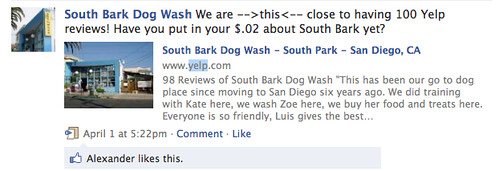

![]()
![]()
This Facebook-er is more blatant. The Lone Star Salon tells Fans if they leave a review on a review site, Lone Star Salon will give them $10. Totally buying a review.


And ….
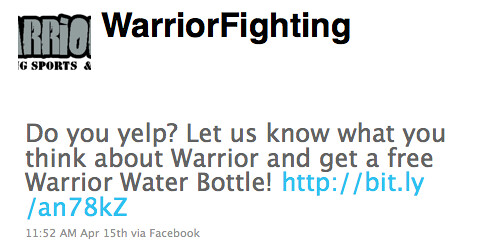

And …
We’re talking about pretty low value transactions here – a water bottle, a free cookie, etc. – but any incentive can be enough for a reviewer to take a few moments to drop a review into a Yelp profile that they would not have done if not incentivized.
Raffle Your Incentive … is Still Incentive
Another way to buy a review is a little more subtle, but it is still crossing Yelp’s guidelines for good Yelping. Essentially it is offering a chance to win a free product or gift certificate in a raffle. It’s not a direct exchange like Lone Star’s program, but these are still incentive for leaving a review.
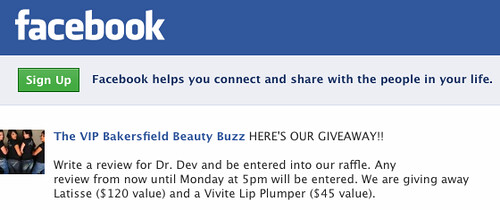



Any reviews on Yelp from these campaigns are not the natural and organic reviewing that is Yelp has struggled to maintain. From Yelp Terms of Service:
“You agree that you will not, and will not assist or enable others to: use the Site in a manner that may create a conflict of interest, such as trading reviews with other business owners or writing or soliciting shill reviews”
And there are a few abusers on Twitter too …
Again, offering a chance to win free product or discount is not directly buying a Yelp review, but it is definitely incentive for the reviewer, warranting the review as forced. Not natural behavior for Ramona Family Naturals.
They tweeted on the 14th and got 2 5-star reviews on the 15th. (I wonder who won the box of organic produce? They should tweet that.)
And The Spot Yogurt in Santa Monica appear to be naively direct in their request.
And before that, they requested on March 31st too.
Of course, we know that ignorance of the rule is not exception from it. Yelp says of this type of false reviewing:
“very often you’ll offend a customer and the offer will be quickly outed in your reviews, resulting in unintended negative reviews and/or negative publicity”
Luther Lowe on business owners aggressively soliciting reviews from customers: “it just looks spammy and decreases the authenticity of your overall presence. That can turn the customers off to you.”
Charles Grumblemouse O. has a more virtuous Yelper attitude. He says of being Paid to write reviews:
“… the impetus for writing reviews is surely different if you’re paid than if you were just doing it for the love right?”


And finally, it’s important to be creative and sincere. Here’s a great case study of a New York Locksmith. He’s got a great perspective on how to get Yelp reviews without direct solicitation.
Image credits: Thanks to “twonjosh,” “Silver Smith,” ZDNEt, and Steve Rhodes for the images!


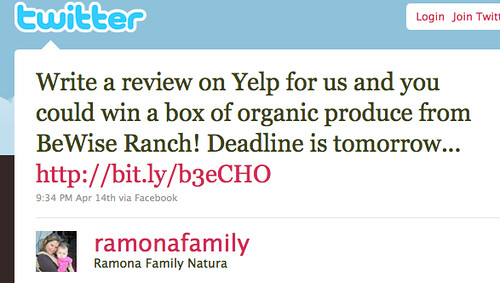

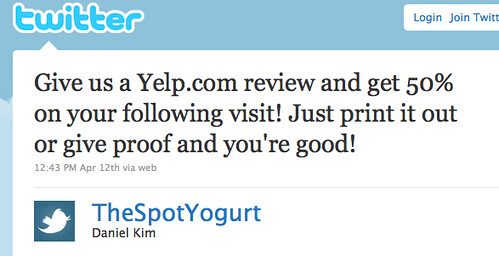


Great article, Lisa. The solicitation of reviews is a big “sticking point” for business owners, as they want to fall within Yelps guidelines, but they also want to encourage their good customers to share their experiences with others, while watering down the occasional negative review. As online reviews influence the Google 7 Pack listings, these reviews (on Yelp and other websites) are vital for gaining this online exposure.
There is definitely a fine line between soliciting reviews and encouraging reviews.
After my extensive interview session with Luther Lowe, from which you have quoted in this article (part 1 can be found at: http://www.webranking.com/blog/yelp-interview-part-1-with-luther-lowe) we got into further discussions about this topic. Off the record, he said it is one thing to blatantly ask for reviews, but another thing to mention to your customers that you have a business profile on Yelp and you would love for them to share their experiences. In this way, you are not offering any incentive to the reviewer, other then allowing them to share their experiences with others, and letting them know about Yelp.
However, as I frequently tell our clients, unless these customers are active members of the Yelp community, their 5-0-1 profile (5 star review, 0 friends, 1 review) will most likely cause the review to get caught by Yelp’s review algorithm filter.
Hey! Thanks for more great additional input, Chris! There is definitely a fine line between aggressively asking for reviews and simply bringing the Yelp profile to the attention of one’s customers. We have to be very careful in the approach.
I have experienced the filter’s wrath myself. I am not a very active Yelper, and my own few reviews have disappeared. I am liking the new check-in feature which may help me to be be more active. 🙂
Amy
[…] Buying Yelp Reviews Is BAD for Business, searchinfluence.com […]
I agree with your points and they can be applied directly to Google LBC reviews too. If you start manipulating your reviews, there is a very good chance of your account being suspended. I have seen 2 of my clients’ LBC accounts suspended this month, due to fake reviews (created by them not me!).
The issue with things like Yelp is that it’s never representative. Like the old saying goes – “Get good service, and you’ll tell one person. Get bad service and you’ll tell everyone.”
No business in the world will make everyone happy all of the time – and it’s that one client in a hundred that’s going to run to Yelp and kick up a fuss.
There’s just not any incentive for happy customers to go on a review site!
@Andy, I totally agree. This is one of the main reasons I think it’s not realistic to suggest that all reviews should be “organic”. The desire to post an online review is anything but Organic. Unless you’re that 1 in 100 you probably need coaxing.
[…] Buying Yelp Reviews Is BAD for Business […]
[…] Buying Yelp Reviews Is Bad for Business Author : Will Scott Date: Tuesday, May 18th, 2010 […]
Yelps system is flawed. Out of 7 reviews on my business’ yelp page, only one did not get filtered. The only one that did not get filtered was the ONLY one written by a competitor bad mouthing my company, as he as so done on several other sites on the same exact day. Seems to me the only reviews that stay are those that are anything less than 5 stars. Yelp has no business on the internet, they do much more harm to our business than any good.
I agree with James – my business has 29 filtered reviews, and the only three negative reviews we’ve ever had make up 3 of only 5 reviews left on our page. I actually have had clients think that I removed their positive reviews, which was very upsetting. I’m wondering when the first slander lawsuit will come out against Yelp, since its negative reviews seem to be the only ones that are guaranteed not to filter out, and in a competitive business world there’s always unethical business owners leaving bad press for their competition. That and Yelp seems to be an easy outlet for teenagers to vent and “be heard,” without any regard for the affect their reviews have on struggling small businesses. Yelp has hurt my business far more than it ever helped it, even with paid advertising. I wish there was a way to remove my business from their site forever.
Beth,
I totally get the sentiment! I’m sure there are lots of businesses who’d like to remove their reviews from lots of sites. Sadly, that’s not going to happen and these sites are protected by law — which sucks.
You really ought to have a look at our “Yelp Review Filter” article. It’s got a bunch of tips to help your filtered reviews get out in the open.
Thanks for your comment and good luck!
I mostly agree with James, I have several filtered comments on my site as well. I spent a little effort trying to resolve them with Yelp, and I didn’t get anywhere. They basically say their “automated detection” does its’ thing, if it gets flagged, it gets flagged. They claim they aren’t able to intervene… Ugh..
Although I agree it’s bad/wrong to purchasing Yelp reviews, certainly I think an incentive isn’t an unfair practice. After all, how many times have you been rewarded for filling out some companies survey, or given a little something extra for spending your personal time giving a business feedback.
This title is flat out wrong. What if you paid people from overseas to create accounts that fool the Yelp filter and post 4 and 5 star reviews that are well written about your business. It works and it’s being done.
The filter catches some accounts but it doesn’t catch them all and this is a huge shill network. And to say that having those reviews is not beneficial to your business is wrong. The shill is here to stay.
Thanks for your input Rocky!
Yelp is helpful, but their reviews are seriously flawed. This follows the pattern online, where only negative reviews are given. On average you might get 1 positive review out of every 100 great transactions, and you will get 1 negative review for every 1.5 bad transactions.
Not an easy world to navigate.
I wrote a review about a pet sitter who took really good care of my pets and it never showed. I can see why it would be considered spamming because I tried to leave a good feedback. I guess if I bad mouthed the business it would of stayed, talk about creating drama online.
By the way Good article
Yelp is a terrible Tool! They are bent on distruction and fed by controversy. They hide behind ammendments that protect them from third party insults. Yelp prefers to play GOD behind the lines, and backs of hard working business owners. Regardless what you prove or disprove if the review in negative they come back with “appears to reflect the personal experience and opinions of the reviewer”. I have been in business for over twenty years, I find a bad review by my competition not a “real person” and try to have it removed- Good luck with that. OH yeah then suspend your account to boot. Personally I would remove the review and leave it at that!
Yelp,is the worst what happened.Pay them a monthly fee and you will have good reviews.They will filter and remove the bad reviews.Any business who had bad reviews from the competition which is advertising with Yelp ,will have a call and a offer for a monthly fee clean the bad reviews.One part of the CO is creating bad reviews,another part is removing them.Do not trust Yelp.
Yeah its weird to pay for reviews. If people can manipulate the reviews than those reviews are useless. The credability of of those reviews are at stake. But i also understand i wouldn`t pay for a bad review if i was a company. However this won`t work. You can`t manipulate the internet. With social media every secret will be released soon.
I am “RamonaFamily” from Ramona Family Naturals and I had no idea I was doing anything wrong. We are just a small health food store in a small town and I was trying to let our customers know that it would help if they reviewed us on Yelp. I never specified what kind of review they should give. We want honest reviews on our Yelp page. The two customers who wrote reviews are actual customers and they wrote their true feelings. You don’t survive long in a small town for long if people don’t have nice things to say about you.
I think it was very rude to pick on us during these hard times. We help to support several families and we are all struggling right now. Small business need a hand, not someone picking on an innocent mistake.
Give me a break!
Hi Victoria,
I think the majority of small businesses don’t realize that incentivizing reviews is frowned upon. And to your credit, you weren’t directly buying a good review, and you didn’t suggest that a reviewer would be eligible for the free produce only with a positive review.
The purpose of the blog post was to illustrate the many ways a business can go astray of Yelp’s review filters — with or without realizing they are astray. There are businesses like yours who are trying to engage their customers online, and there are businesses out there who are grossly abusing online reviews.
You will notice that today you have 2 reviews on Yelp, both from 2011 from active Yelpers. Neither of these are reviews resulting from that tweet in 2010.
Today, you also have 17 filtered reviews of which I assume include the 2 from April 2010. Those 2 customers who you say wrote truthful reviews in 2010 were filtered. Likely, because they weren’t active Yelp reviewers, not necessarily because their reviews were disingenuous. That is an example of some of our concerns over Yelp’s review filters – lots of probable legitimate feedback from actual real customers get caught in Yelp’s filter. We talk about it more here in a guest post here.
I think you’re on the right path; but I would encourage you to encourage your loyal customers, without reward for doing so, to leave you a review on your Google+ listing or on your Yahoo listing or Citysearch instead of Yelp.
Good luck!
Amy
Yelp is a total scam.
They are very good at selling you on the “legitimacy” of their filters. Take a look at the following paragraph:
“Some reviewers are more credible than others. For the most part, users can decide for themselves which reviewers they trust the most. We remove some of the guesswork by filtering out reviews that are written by less established users. We do this in order to provide more trustworthy and useful content to our users and to help protect against fake reviews from malicious competitors and disgruntled former employees.”
Now, in layman’s speak, this is a helpful filter. See, look, they are helping filter out “… less established users.. to help protect reviews from malicious competitors and disgruntled former employees.” What GREAT people at Yelp!
But if we critically think about this statement, what are they really doing? Preventing those who don’t spend a lot of time on Yelp! from posting reviews. This is a conflict of interest, because they sell advertising to their users! Of course they don’t want people to get on once and leave a review. They want you on multiple times per day. Not posting “less established users” reviews is is simple way to coerce people to get on Yelp more often. Who would want their reviews filtered, especially if they are truly fond of the business? The answer is simple. Spend more time on Yelp! so they can sell you things and oh yea, sell you the businesses direct competitor who is paying for the top spot.
The leads me to my next point, paying Yelp for advertising. Since they are protected by law, they can use whatever algorithms they want. So, if you pay them, all of the sudden your great reviews get posted! Weird. Weird how that works. I am not saying they are extortionists, and I’m not saying Yelp! is a racket, but…